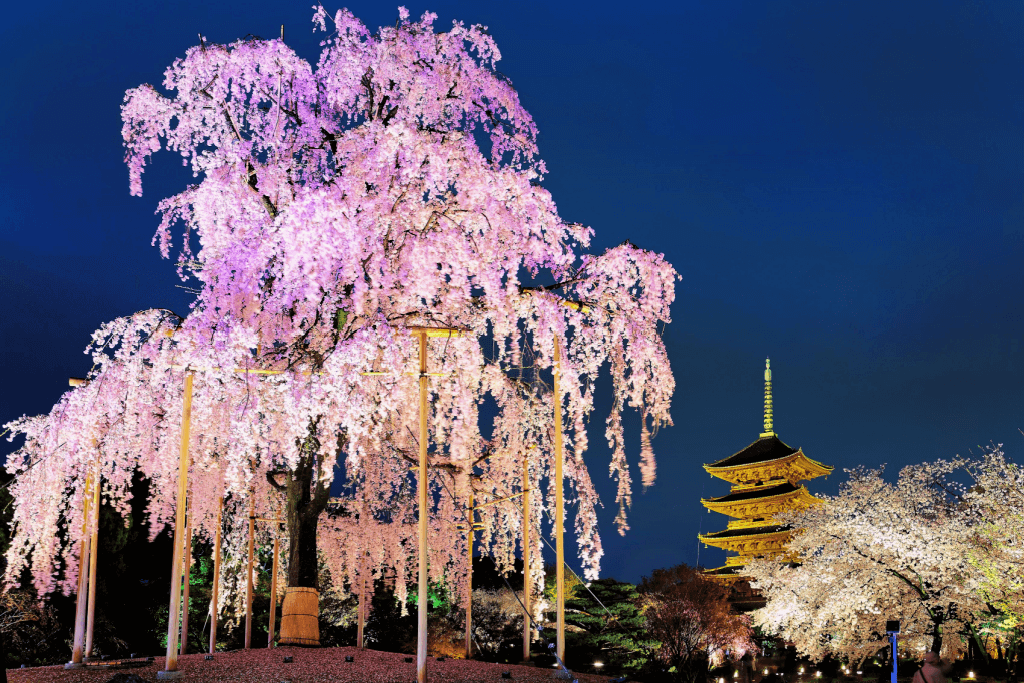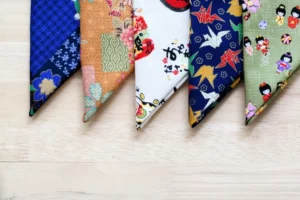During the moonlit sakura season, we explored the rich tapestry of spring in Japan and went on a food adventure that inspired us. There was much to enjoy during that time, from the delicate beauty of the cherry blossoms in Shizuoka to tasty treats like strawberry daifuku and uiro mochi. Let’s look back at the moonlit sakura season and the many things we enjoyed in the spring.
Table of Contents
ToggleMoonlit Sakura in Shizuoka
Japan’s Shizuoka Prefecture has many beautiful places to see cherry blossoms. The Okuni Shrine in Mori Town is a place you must see. The shrine is a beautiful place to see cherry blossoms because quiet woods surround it and faces Mount Ashitaka. Take walks through the shrine grounds and enjoy the peace and beauty of the leaves falling from the trees.
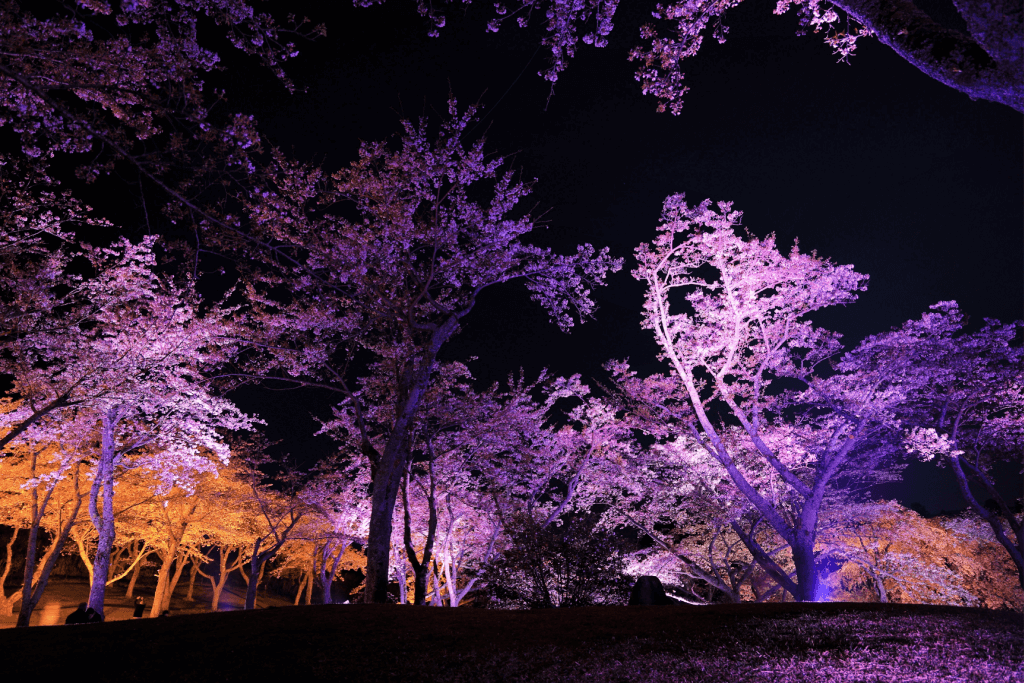
Miho-no-Matsubara, on the Miho Peninsula, is another excellent place. It has a beautiful view of the Pacific Ocean and 30,000 pine trees lined up in a row along the coast. With Mount Fuji in the background, cherry blossoms, pine trees, and the ocean combine to make a mesmerizing scene.
If you want to be in a city, Shizuoka City’s Nihondaira Plateau is an excellent place. During the cherry blossom season, the hill looks like a magical place. Cherry trees grow on the sides of the hills, making the scenery look pink. Take beautiful pictures, walk along the paths, and enjoy the peaceful atmosphere of this flower show.
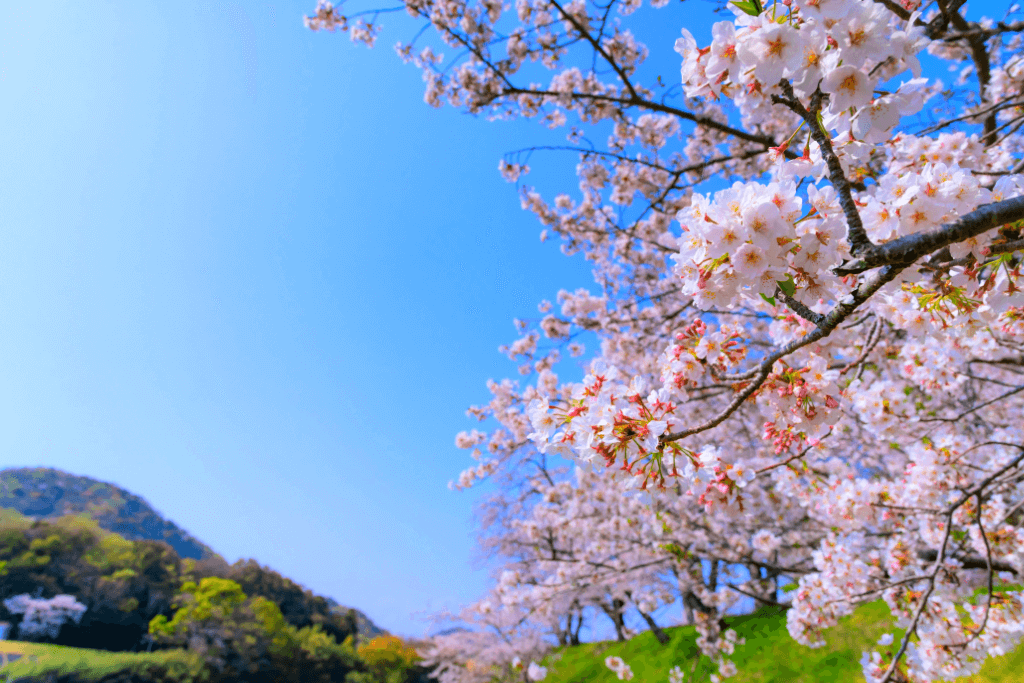
You can also participate in the fun Kawazu Sakura Festival, which honors cherry trees opening early. As you walk along the Kawazu River, bright pink flowers make the area feel like a party. Enjoy local specialties, try your hand at traditional games, and get into the happy spirit of the event.
Shizuoka Prefecture has a lot of places to see cherry blossoms, each with its charm. Shizuoka is a great place to see Japan’s famous cherry blossoms, whether you want peace at Okuni Shrine, coastal beauty at Miho-no-Matsubara, urban charm at Nihondaira Plateau, or a lively mood at the Kawazu Sakura Festival.
Strawberry Daifuku: A popular treat under moonlit sakura
Strawberry daifuku is a famous Japanese sweet with a beautiful mix of different tastes and textures. This tasty snack blends the natural sweetness of ripe strawberries with the soft, chewy pleasure of mochi rice cakes.
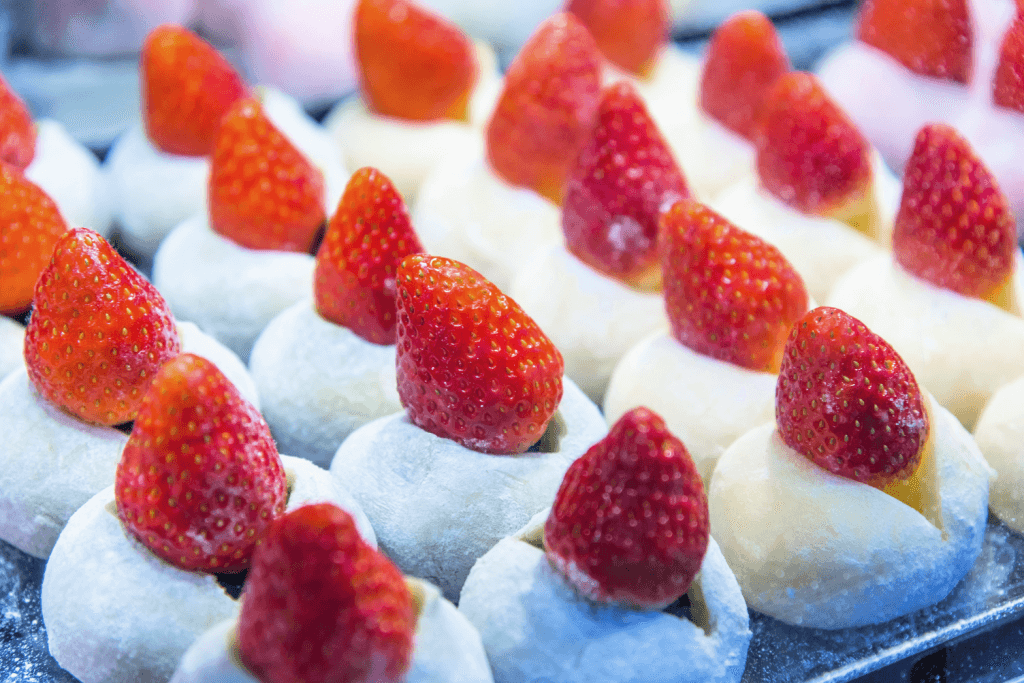
When you bite into the smooth red bean paste (anko) and get a bite of the juicy strawberry inside, it’s like a symphony of tastes and textures. The anko’s mild earthiness goes well with the strawberry’s bright sweetness. This sweet is wrapped in mochi, made from sticky rice flour, and is soft and stretchy. The chewy texture and bursts of flavor are a great combo.
Strawberry daifuku is both pretty and delicious. It is covered with kinako, or powdered sugar, and has different colors and textures. Enjoy this tasty snack that shows how the seasons change. It is expected in the spring when strawberries are at their best.
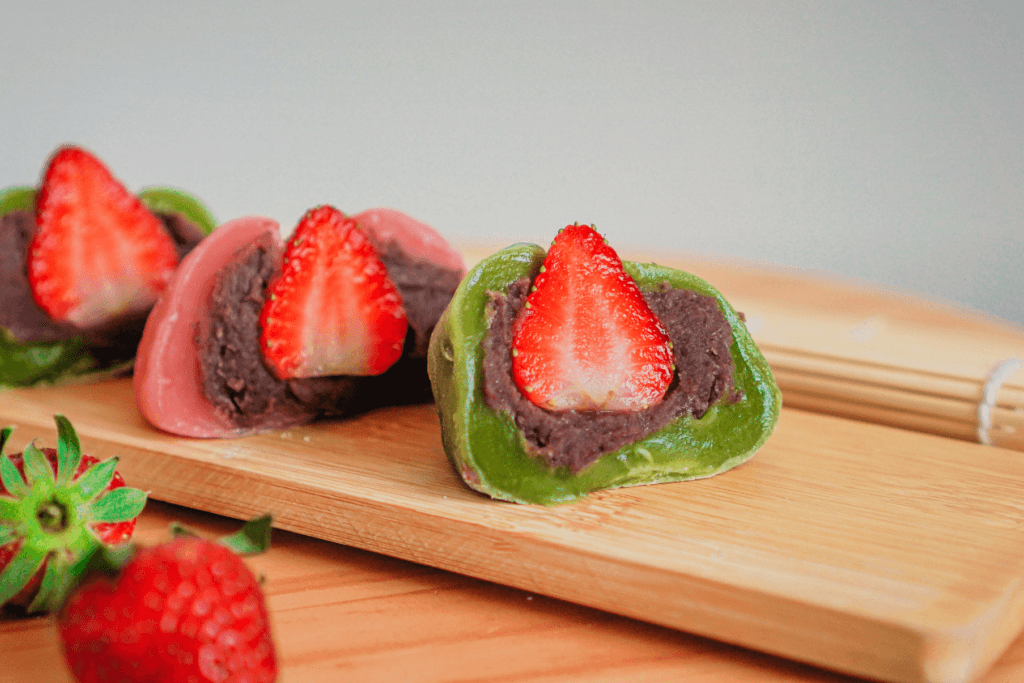
Overall, this confection adds a bit of elegance and joy to any gathering, whether it’s a big event, a formal tea ceremony, or a special moment under blooming cherry blossoms. Immerse yourself in the allure of this tempting treat and let its exquisite mix of flavors and textures take you to a world of pure culinary happiness.
Do you love delicious seasonal snacks? Check out Sakuraco! Sakuraco delivers traditional Japanese snacks, sweets, tableware, and more from local Japanese makers right to your door, perfect for a pleasant snack time at home!
Uiro Mochi: An unusual rice cake
Uiro mochi is a traditional Japanese sweet with a jelly-like and sticky texture and a bit sweet. It’s a Japanese sweet made from rice flour, sugar, and water. It feels smooth and quickly dissolves in the mouth. Careful cooking gives it a delicate, jelly-like texture, soft and satisfying.
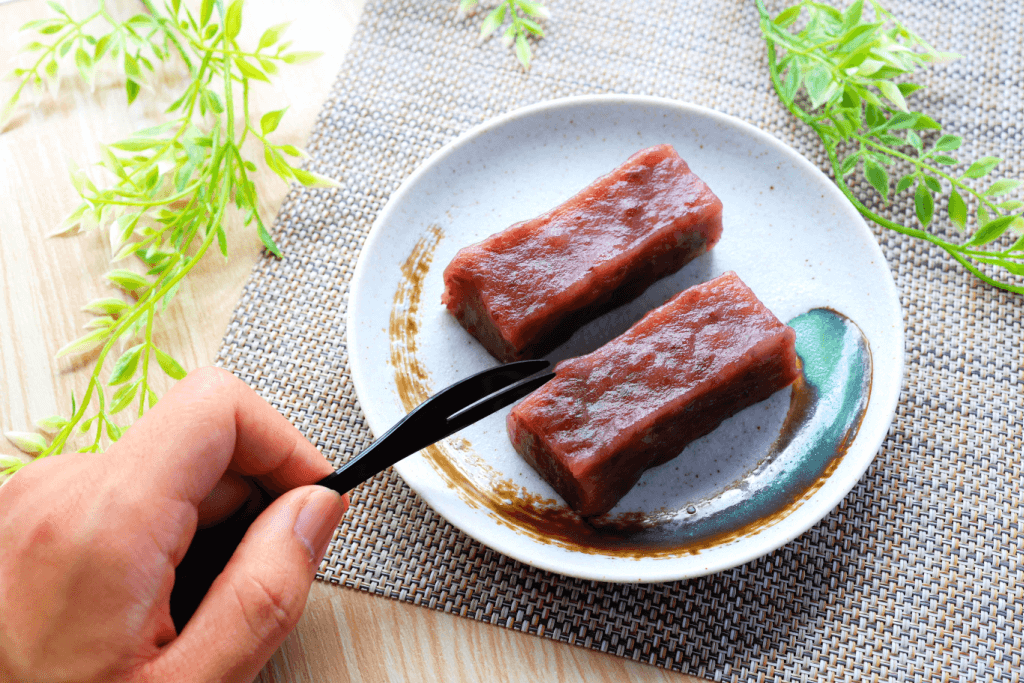
When kinako or matcha powder is used to decorate uiro mochi, the dish looks and tastes as good as it looks. Uiro mochi is excellent for parties, tea ceremonies, and events that mark the change of the seasons. You can enjoy it by itself or mix it with green tea. Enjoy this one-of-a-kind treat for a taste of pure pleasure. Each bite combines tradition, skillful art, and pure pleasure.
Genji Pies: An elegant Japanese pastry
Genji Pies are classic Japanese treats perfect for sweet lovers. These sweet, bite-sized treats include rich custard, chocolate, matcha, and seasonal variations. Even though these snacks come from the West, many people like them. The flaky pastry shell has the right buttery flavor to meet the crunch. Genji pies are delicious with tea or coffee. They are a great way to take a break or end a meal on a sweet note.
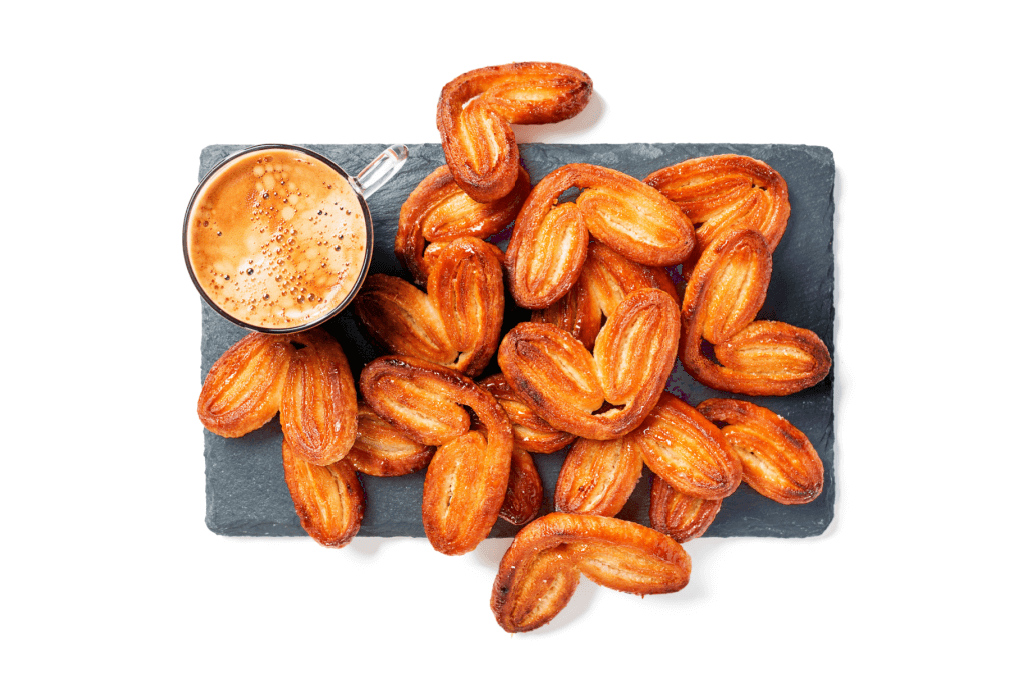
These popular souvenirs come in cute boxes with traditional Japanese designs, making them the perfect gift to show Japan’s food history. Genji pies are hard to avoid because they have a flaky crust and heavenly fillings. Eating one is a truly memorable experience. Take the chance to try these delicious treats and learn about the rich flavors and customs that go along with them. Enjoy their delicious treats next time in Kyoto, or see Genji Pies elsewhere.
Bonus: Sustainable Sweet Potatoes
Japanese sweet potatoes are famous because Japan eats them in a way that is good for the environment. These flexible tubers have great flavors and help keep food supplies going. They need fewer pesticides and fertilizers, which makes the environment healthier. Japanese sweet potatoes improve the quality of the soil, prevent it from washing away, and reduce the need for too much watering.
People are becoming more interested in local and seasonal food, which helps support healthy farming and reduces carbon footprints. Since Japanese food focuses on using fresh ingredients, it fits well with methods that are good for the environment.
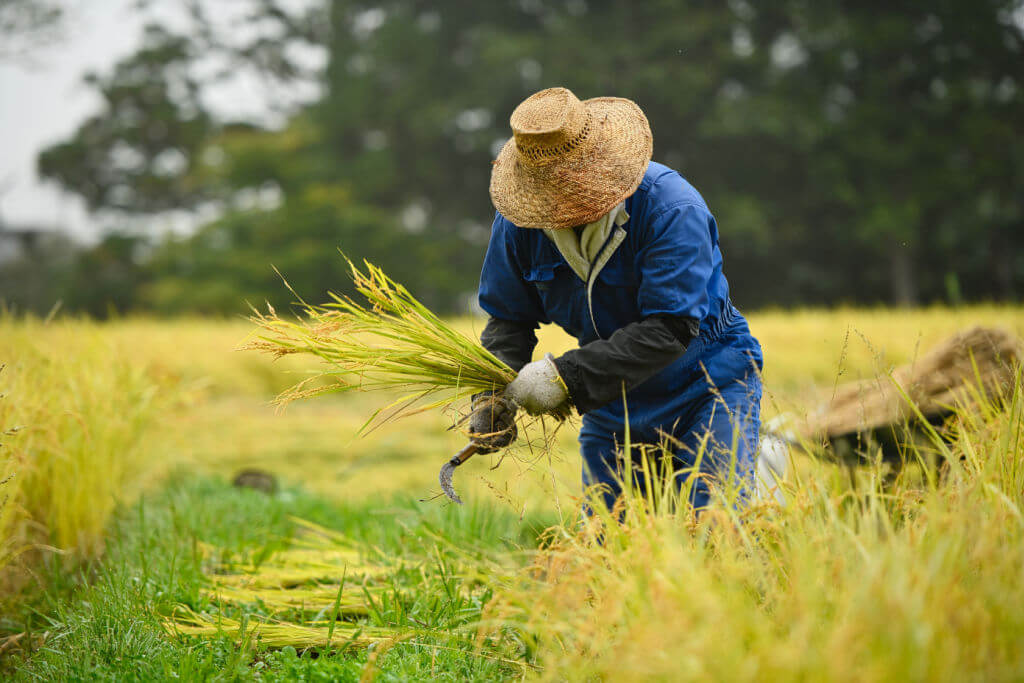
Exploring Japanese food, especially at a sakura party under the moonlight, shows a tapestry of delicious tastes. Moreover, the beautiful sakura flowers in Shizuoka Prefecture are a sight. Their gentle beauty captivates the senses. You can immerse yourself in the enchanting atmosphere as you enjoy strawberry daifuku, uiro mochi, and Genji pies, a delicious mix of traditional tastes.
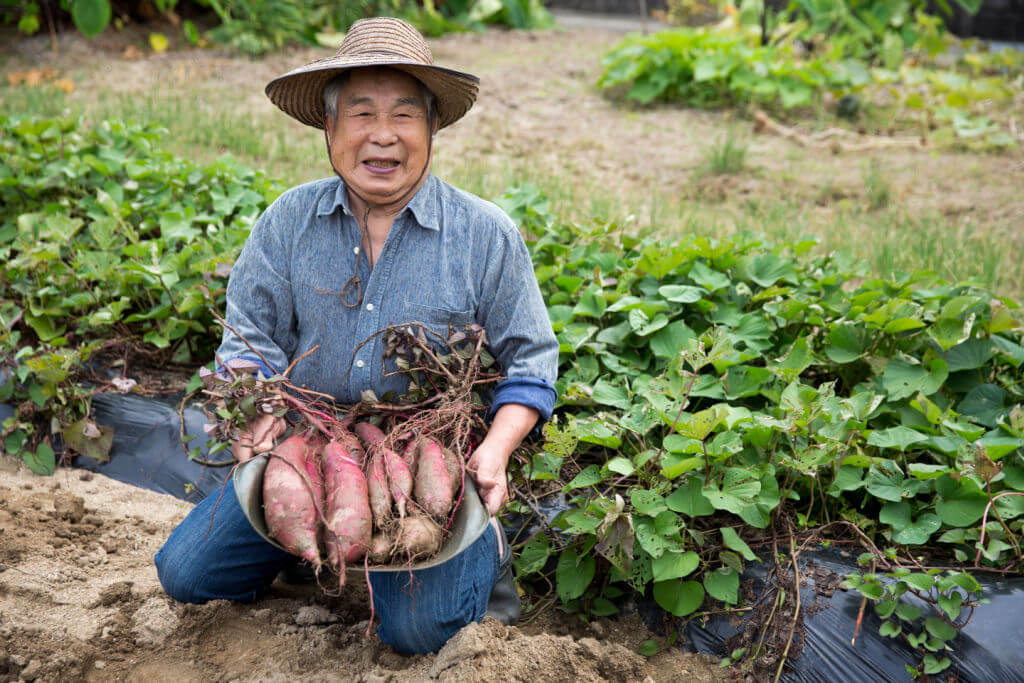
Generally, speaking Japan’s commitment to sustainable food methods is also shown in how they grow sweet potatoes, a sustainable crop. We start a trip that honors the natural beauty and cultural heritage of moonlit sakura parties from this past spring by celebrating these delicious things and making choices that are good for the environment. Did you see the cherry blossoms at night with the people you care about? If so, what kind of food did you eat? Tell us in the comments section below.


